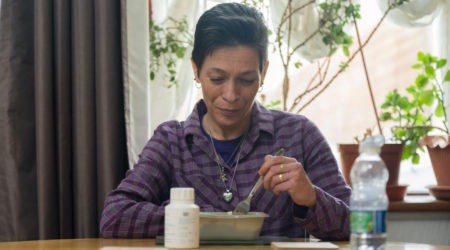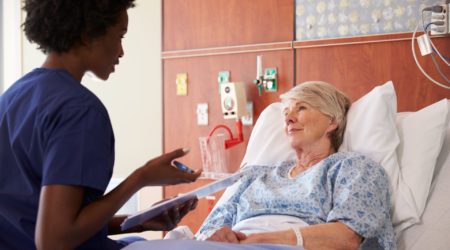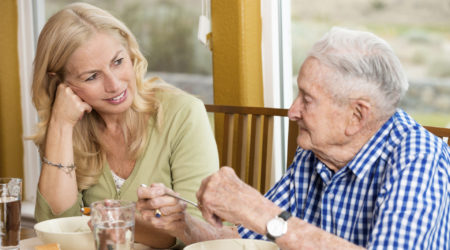



Petra
Petra, 47, was diagnosed in 1999 with operable adenocarcinoma of the pancreas.
At the age of 47, on 10th December 1999, I developed symptoms of jaundice, pale stools and dark urine. Following blood tests, ultrasound, CT scan and ERCP I was diagnosed with pancreatic cancer on Christmas Eve 1999. As my father had died of untreatable pancreatic cancer a year after his diagnosis in 1993, I was keen to find out what could be done to help!
Despite the festive season and new millennium occurring at the time, I was immediately referred to Poole Hospital, and was seen by my Surgeon on 7th January 2000. He informed me that he could perform a Whipple’s operation to remove the cancer. My operation took place on 12th January 2000.
It was fairly major surgery, involving the removal of 1/3 my pancreas, ½ my stomach, my duodenum, gall bladder and bile duct, and then basically plumbing me back together using spare bits of bowel. I was in hospital 11 days, and then off work for 3 months. I need to take antacids (Lanzaparazole) to prevent stomach acid (as the bit that would prevent it naturally isn’t there anymore) and also a pancreatic enzyme (Creon) so that my food digests properly, but otherwise no other treatment or medication.
Following my return to a fairly high-powered job I found that I suffered a lack of stamina, possibly because of lack of appetite, and I became depressed as I wanted to be able to do it all! Eventually after trying to work only part-time, I was retired from my job in 2003. It was actually a relief not to be under pressure, and to adapt to my own pace of life!
Since then I have been thrilled to welcome three grandsons into the world, and to have enjoyed spending time with them. I have also enjoyed several holidays, in particular a trip to my namesake ancient city, Petra in Jordan, which I had wanted to visit for many years.
Voluntary work, such as Samaritan volunteer and local community hospital League of Friends has enabled me to give a small bit back to the community.
Life after pancreatic cancer hasn’t always been easy, and I have had occasional bouts of pancreatitis and depression, but on the whole it’s been wonderful, particularly thanks to my husband, Dave, my children, grandchildren and great neighbours.
April 2011
Update June 2012
Since writing this last year, I haven’t had pancreatitis again, have sought and received counselling for recurrent depression and now feel much more whole again.
I have also discovered people on this site who have inspired me to be more active in support of this charity – finding understanding is a really important part of the healing process.
Petra’s diet experience after the Whipple
I had a Whipple’s procedure carried out in January 2000 following a diagnosis of pancreatic cancer.
Following my return home I found my appetite severely lacking. As well as a strange taste in my mouth, I found the thought of food nauseating, though I knew I had to ‘build myself up’.
Trips to the supermarket became a nightmare for several months: my husband was trying to tempt me by suggesting food I might like, and I could only feel sick at the thought of food.
I was prescribed build up supplements which I tried to take, but found unappetising because of the strange taste in my mouth, and also because they left me feeling strangely tired rather than energised.
A dietician who called me anorexic suggested keeping cream cakes in the fridge, which I found unhelpful, but happily it appears she was the last of a previous breed of dieticians who did not fully appreciate what had happened to me.
A breakthrough came firstly through my husband’s own efforts when he bought smaller plates to serve meals on, which made it much easier to think about eating at least a small portion- it is surprising how much value this simple trick had to begin me on the road to recovery.
Secondly my GP recommended Creon, a pancreatic enzyme to aid digestion of fats. It was much easier to eat knowing that this would not be followed by what is medically known as ‘floaters’ in the loo afterwards!
Thirdly I was given a glucose tolerance test which showed that rather than developing diabetes, which is more common, I had something called ‘dumping syndrome’. What this means is that whatever I eat my residual pancreas thinks I have had 20 bars of chocolate and produces enough insulin to deal with them. This insulin then takes away any sugar I may have floating around and devours it, which is why I get tired and light-headed after meals (hypoglycamic).
The simple answer to this is to eat low glycaemic index foods, such as oats, lentils, apricots, which take longer to release sugar, so keep on producing benefits without the insulin destroying them. I certainly don’t eat cream cakes!
Certainly nowadays dieticians are much more aware, and I would recommend asking to see one if you haven’t been offered it.
Meanwhile I manage to maintain weight, albeit low, and to continue to enjoy life to the full.
July 2011




